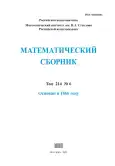Vol 214, No 6 (2023)
 3-40
3-40


How is a graph not like a manifold?
Abstract
For an equivariantly formal action of a compact torus
 41-68
41-68


Forms of del Pezzo surfaces of degree 5 and 6
Abstract
We obtain necessary and sufficient condition for the existence of del Pezzo surfaces of degrees
 69-86
69-86


Algebra of shares, complete bipartite graphs, and $\mathfrak{sl}_2$ weight system
Abstract
A function of chord diagrams is called a weight system if it satisfies the so-called four-term relations. Vassiliev's theory describes finite-order knot invariants in terms of weight systems. In particular, there is a weight system corresponding to the coloured Jones polynomial. This weight system is described in terms of the Lie algebra
We obtain formulae for the generating functions of the values of the
We introduce the algebra of shares and the
 87-109
87-109


Comparison theorems for evolution inclusions with maximal monotone operators. $L^2$-theory
Abstract
An evolution inclusion with time-dependent family of maximal monotone operators in considered in a separable Hilbert space. If the elements with minimum norm of the family of maximal monotone operators satisfy certain growth conditions, then the domains of definition of this family are closed convex sets. Hence the sweeping process is well defined, whose values are the normal cones of the domains of definition of maximal monotone operators. It is shown that if the sweeping process has a solution for each single-valued perturbation from the space of integrable functions, then the evolution inclusion with the maximal monotone operators and single-valued perturbations from the space of integrable functions is also solvable. Quite general conditions in terms of the properties of the family of maximal monotone operators that ensure the existence of solutions for the sweeping process are presented.
All results obtained and the approach presented are new. They are used to prove an existence theorem for evolution inclusions with multivalued perturbations, whose values are closed nonconvex sets.
 110-135
110-135


On the multiplicative Chung–Diaconis–Graham process
Abstract
We study the lazy Markov chain on
 136-154
136-154











